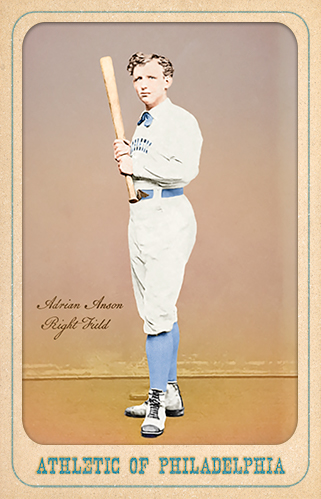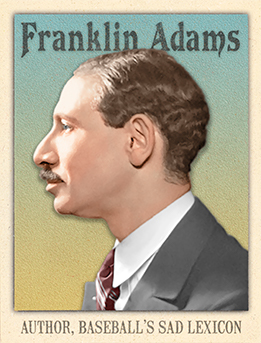
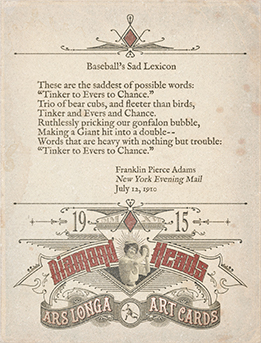
- Series: Diamond Heads '15
Franklin Pierce Adams (1881-1960) was known to his readers as F.P.A. His column “The Conning Tower” was a literary staple in the diet of New York’s literati from 1914 until 1941. Adams had come east from his native Chicago ten years prior as a sportswriter/humorist, signing on with the Evening Mail. His column, “Always in Good Humor” mixed sports items with reader contributions. His popularity was a mere hint at the impact he would have after moving to the Tribune and launching the Conning Tower. Adams’ column introduced New York and the world to many of the great writers and humorists of his day: Robert Benchley, Edna Ferber, Dorothy Parker, James Thurber and many others. F.P.A earned his stripes literally and figuratively after enlisting in WWI. He wrote for Harold Ross, editor of the Stars and Stripes and established a reputation as a wordsmith and master of the English language.
Adams became a charter member of one of America’s greatest literary salons, a daily luncheon at the Algonquin Hotel in Manhattan. The circle of playwrights, journalists, poets, editors and show business celebrities came to be known as the Round Table and was a fountain of wit and word-play that spread coast to coast for a decade, ending only when the nation plunged into Depression. It must have been the height of irony to such a leading-light in America’s literary scene that Adams’ fame lived on long past his demise, not for his incisive wit, his eye for talent, his hobnobbing with the cream of society but for an eight-line bit of doggerel he had tossed off for a column on July 12, 1910. Originally titled “That Double Play Again,” it appeared first in the NY Evening Mail on the eve of a Cubs-Giants series. As F.P.A. was en route to the Polo Grounds, he dashed off the piece to meet his editor’s demand for filler for that night’s column. He thought it forgettable and so did his editor. On the 15th the Chicago Daily Tribune reprinted the lament as “Gotham’s Woe.” But on the 18th, the Evening Mail ran it again, this time as “Baseball’s Sad Lexicon” and history was made. The ode took on a life of its own and immortalized the Cubbies’ infield, probably securing their admission to Cooperstown:
Baseball's Sad Lexicon
These are the saddest of possible words:
“Tinker to Evers to Chance.”
Trio of bear cubs, and fleeter than birds,
Tinker and Evers and Chance.
Ruthlessly pricking our gonfalon bubble
Making a Giant hit into a double
Words that are heavy with nothing but trouble:
“Tinker to Evers to Chance.”
- This card is not included in the 100-card Diamond Heads '15 base set.
- This card is one of the rewards you receive for completing the Ars Longa Clubhouse Challenge: Tinker to Evers to Chance
- This card is exclusive to that challenge, is gifted freely to winners of the challenge, and is neither bartered nor sold otherwise by Ars Longa.
- This is one of two such Diamond Heads '15 Clubhouse Challenge reward cards. The other is Frank "Wildfire" Schulte.

- Series: 1919 Black Sox Scandal
Abraham Washington Attell (1884-1970) grew up on the streets of San Francisco relying on his fists to punish the bullies foolish enough to come after him. He gained national renown by taking the featherweight title in 1901. He regained the belt in ‘06, going on to defend 18 times. He became a popular Manhattan store owner before taking his Little Champ act to vaudeville while continuing to box occasionally until 1917.
Attell became notorious for his alleged involvement with “The Big Bankroll” Arnold Rothstein. He was reputed to be A.R.’s sometime bodyguard. Whatever friendship Abe may have had for the greatest crime lord of his day, Rothstein did not reciprocate, as indicated by his testimony in the Black Sox prosecution: “The whole thing started when Attell and some other cheap gamblers decided to frame the Series and make a killing. The world knows I was asked in on the deal and my friends know how I turned it down flat. I don’t doubt that Attell used my name to put it over. That’s been done by smarter men than Abe. But I was not in on it, would not have gone into it under any circumstances and did not bet a cent on the Series after I found out what was underway.”
Many who have tried to unravel the sordid affair assert that Attell and another gambler, Sport Sullivan, vied for the direct role in the fix. Rothstein, it has been reliably reported, sought to take advantage of the rivalry among leagues of gamblers to make a killing as a bettor, not, as was oft alleged, as the financial backer of the misbegotten enterprise. In any event, Abe Attell became inextricably tied to Rothstein and was one of those formally charged. He fled to Canada for a year, supposedly to avoid being deposed. Eventually he and others were prosecuted, but the case dissolved when, wonder of wonders, the whole grand jury file somehow disappeared. The fingerprints of notorious defense attorney Bill “The Big Mouthpiece” Fallon seemed to be all over the matter, perhaps explaining why he made the big bucks.
- Before his alleged involvement in the Series fix, Attell’s stellar fight career had included a first: he and brother Monte, a bantamweight, became the first brothers to hold concurrent world championships
- In 172 professional fights, Attell lost just 9 of them. He won 125, 51 by KO, and had 21 draws and 8 no contests.
- Despite the stain of scandal, Abe lived a long and colorful life and was honored with numerous inductions into boxing halls-of-fame, including the Boxing Hall of Fame in 1955, the National Jewish Sports Hall of Fame in ‘82 and the San Francisco Boxing Hall of Fame in ‘85
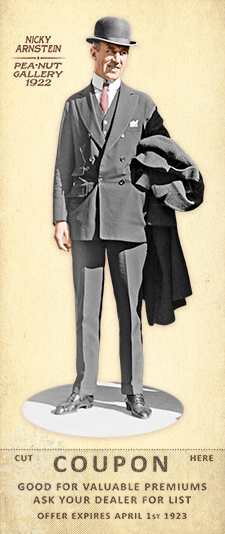
- Series: 1919 Black Sox Scandal
Julius Wilford Arnstein (1879-1965) was a dashing 6’6” charmer, capable of so beguiling his rich and beautiful friends that they never saw his cons coming. Born in Berlin to a Jewish father and raised in New Jersey as an Episcopalian, Arnstein seems to have embraced that duality as he spent much of his life on each side of the law. “No boy could have been brought up with more love and care than was I,” he recalled. He bemoaned that his love for “the beautiful things of life” was overshadowed by his “fondness for the cards, the dice, and the horses.” He plied the trade of riverboat gambler on the high seas, fleecing the cream of society on ocean liners and the casinos of the continent. He idolized his hero and mentor Arnold Rothstein and would gush about A.R.: "He was an honest man, with an outstanding integrity. He had daredevil courage.” This of the man who made Nicky his “admirer, partner and fall guy.”
As skilled as he was at entrancing his marks, Arnstein was blinded by his devotion to Rothstein. He hired A.R.’s famed legal eagle Bill Fallon, the “archetype amoral criminal defense lawyer” who guided Nicky to become perhaps the first defendant to “take the Fifth” in a securities theft case. Nicky beat the rap but, after the fatal gaffe of insulting Fallon, was convicted in a Federal trial with lesser counsel. Undoubtedly it was Nicky’s involvement with Rothstein that implicated him with the “usual suspects” - various gamblers and gangsters of the era - in the Black Sox scandal. If the standard for a “perfect crime” is that no one goes to jail, then the 1919 Series Fix fits the bill. Nobody spent a day in jail, but the National Pastime was severely tarnished and forever changed. Charles Comiskey forcibly disbanded one of the most talented teams of the deadball era, losing eight players to lifetime bans from the game, subsequently condemning one of the sport's all-time greatest stars of any epoch - Shoeless Joe Jackson - to permanent exile.
- Arnstein was famous for his lover and eventual wife, vaudeville queen Fanny Brice. She was faithful as he sat in Leavenworth but divorced him upon his release
- Nicky abandoned the criminal life following his second and final prison term in 1927, moved to LA and prospered. That nickname, by the way, is said to have come from the nickel-plated bike he road as a kid. For all his aliases, that one is the most prosaic
- Perhaps a fitting epitaph of Arnstein’s could be words used in Bill “The Big Mouthpiece” Fallon’s obituary: “his intelligence, eloquence and panache forever stand trial beside his immorality, dishonesty and self-indulgence.”
- Series: Athletic of Philadelphia: 1874
- City: Philadelphia
- Team: Athletics (NAPBBP)
- League: National Association (NAPBBP)
- Hall: National Baseball Hall of Fame
Adrian Constantine Anson (1852-1922) was Mr. Longevity, a big, brawling cyclone of controversy & batsmanship unrivaled in the early days of pro ball. He set hitting standards that only the greatest future players would approach or break. He also, by dint of his ferocious personality, may have been the single greatest force for segregation in baseball until Branch Rickey began to reverse that sad estate.
- Played a record 27 consecutive years in the NL
- First batter to 3000 hits, using his powerful arms to create line drives with a short swing
- Managed the Chicago NL team to five pennants and still holds the Cub franchise records for hits, doubles, runs scored and runs batted in
- Elected to Hall of Fame: 1939
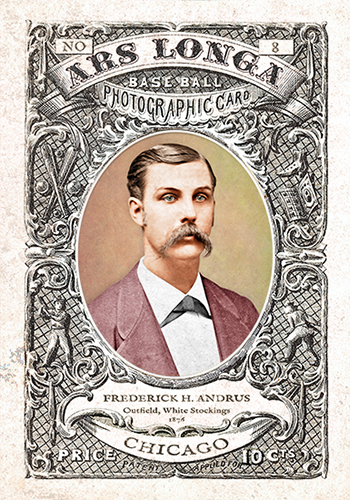
- Series: Mort's Reserve
- City: Chicago
- Team: White Stockings
- League: National League
Frederick Hotham Andrus (1850-1937) had the distinction of making major league baseball a part time occupation. Fred always held gainful employment but stayed close enough to the game to get two opportunities to play at the pinnacle of the sport, both with Chicago. His first brief tour was in 1876 where he played outfield in eight games for the champion White Stockings in the National League's inaugural season. He made a good record, hitting .306 in 36 plate appearances with three doubles and two RBI. Eight years later Andrus returned for a single game for the White Stockings, this time as a pitcher. He completed his start while yielding three runs, two earned, for a “career” ERA of 2.00. Andrus is known to have played for only one official minor league club, Milwaukee of the League Alliance, in 1877. He was one of two managers for the team that year along with Pidgey Morgan. Milwaukee was one of 29 teams vying in the agglomeration known as the League Alliance. It had formed in response to a perceived threat by a rival professional organization, the International Association of Professional Base Ball Players challenging William Hulbert's new National League. Spalding had managed Andrus at Chicago in '76 and was heavily involved with Hulbert in navigating the tumult as the nascent NL established itself as THE major league. In fact, Spalding had founded his famed sporting goods company in 1876, a franchise Andrus would serve as treasurer for eight years beginning with his move to Chicago in 1884. Undoubtedly, it was the high-level connections Andrus had forged in baseball and in business that gave him the entree for his cameo appearance that year back with his old Windy City team.
- Andrus had started out in his native Michigan playing for the Mutuals of Jackson, possibly a successor to one of the earliest organized clubs in America. The Daybreak Club of Jackson had begun in 1860. Jackson had another claim to fame as, in 1854, a meeting “Under the Oaks” just outside of town was the site of the founding of the Republican Party
- Fred left Spalding's company to manage a Detroit real estate concern with which he was still employed at his death from pneumonia at age 87




